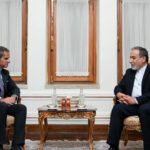By feyzullah tuna aygün

Iraq’s social composition has increased its cultural wealth, but has also raided the way for ethnic and sectarian tensions. After the overthrow of the Baath regime in 2003, ethnic and religious tensions have constantly increased, and the conflicts between identity slimps become one of the main threats for the stability and social cohesion of the country. In this piece, I describe the reasons for this worrying development.
First, in the period after 2003, identity -based political structures have become stronger and institutionalized within state mechanisms. Second, the laws adopted in Parliament are increasingly organized to serve the interests of certain identity groups, showing the influence of identity policy on legislative processes. Finally, rivalries and conflicts Inside Identity groups demonstrate the degree to which identity policy has been not only between different ethnic and sectarian groups, but also within the same group. This increase in identity policy has become a threat to the political stability of the country.
Institutionalization of identity policy
In the period after 2003, state mechanisms have been under the influence of certain ethnic and sectarian groups such as Shiite, Sunnites and Kurds. While this practice may have intended to increase the political representation of the many ethnic, religious identities and based on the Iraq sect, it has led to deep divisions between sectarian and ethnic grouts.
In this process, identity policy also affected the relations between the different components of society. Ethnic and sectarian identities have become the main factors that shape both political speeches and public policies. Even the distribution of services at the local level is based on identity -based interests. This has led to a perception of injustice among citizens (particularly those marginalized by these arrangements) and has made national integration more difficult.
In this historical process, identity policy has not only deepened social fragmentation, but has also negatively affected the functioning of Iraq governance mechanisms. Identity -based divisions have created a continuous crisis environment in government formation processes by hindering reconciliation. This has become a long -term effect of the institutionalization of identities in Iraqi policy.
Identity -based approach to legislative processes
Iraq’s legislative processes have mostly formed the legs to protect the interests of specific ethnic and sectarian identities. The decision -making tasks and laws promulgated in Parliament are of the results of the political negotiation between different groups. This situation has clearly demonstrated that legislative processes have been intertwined within a structure based on identity.
The approval of the General Law of Amnesty, the Law of Civil Status and the Law of Land Restitution in the same Parliamentary Session of 2025 was an example of identity -based policy on legislative processes. The three laws included regulations in favor of the interests of the different identity groups. The General Law of Amnesty was specifically aimed at forgiving members of sectarian groups that had been involved in conflicts, while the Law of Civil Status provided an in -line regulation with the norms of religious and sectarian identities. The land restitution law, on the other hand, aimed to regulate the property rights of ethnic groups and obtain the support of Turks and Kurds in particular.
The vote of the competence of these laws can be explained by the efforts of political leaders to satisfy differentity groups. However, this situation clearly shows how identity -based policy forms legislative processes. As much as the content of the laws, its simultaneous approach also led to a serious debate about its procedural legitimacy. The opposition parliamentarians argued that these regulations were adopted in violation of legislative procedures and presented a request to the Federal Supreme Court, which was rejected.
Divisions within the identity groups
Chiite, Sunnitas and Kurdish intragrupal divisions are often fed by factors such as local interests, external influences and leadership struggles. This further increases the fragmentation of Iraqi policy. The rivalry between Shiite groups is one of the most outstanding examples of intragrupal divisions in Iraq. The tension between the Sadrist movement led by Muqtada al-Sadr and the coordination framework backed by Iran has led to serious problems in the formation processes of government and social peace. In 2022, the duration of clashes in the tensions of the green zone spread to the streets and armed violence. The armed clashes of 2024 between Saraya Al-Salam and Asa’ib ahl al-haq in Basra show how fragmented is the Shiite identity within ITIIFF.
Divisions are also being experienced among the Sunitas. In particular, the rivalry between the Taqaddum coalition led by Mohammed al-Halbousi and other Sunni groups is formed by local interests. Halbousi is criticized by other Sunni leaders, and this has led to a division between different slimers within the Sunni identity. This division affects the balances within the Parliament after the elections and deepens the problems of representation in the Sunni regions.
The rivalry between the Kurdistan Democratic Party and the Kurdistan Patriotic Union is one of the greatest obstacles that weaving the Kurdish unit. The conflicts of economic and military interests between the thesis two parties have led to a divided Kurda identity. The Division of the Peshmerga forces between the two parties is a specific indicator of this. The emergence of the new generation movement in recent elections, on the other hand, the disaffection of Kurdish youth towards traditional parties, which can lead to a new dynamic of the Iraqi Kurdish identity of division.
These divisions within the Shiite, Sunnitas and Kurds groups show that the identity policy in Iraq is a topic of several layers. Intragrupal tensions also represent a serious threat to social peace and national integration.
Identity policy becomes more influential
In the period after 2003, the reconstruction of state mechanisms for ethnic and sectarian reasons led to the institutionalization of identity policy. The arrangements made to protect the interests of certain groups in legislative processes and internal conflicts within the identity groups show that the process has depended not only on politicians but also at the social level. At this point, the identity policy has weakened the construction of the national identity of Iraq, has led to a dead point in government formation processes and has made political instability permanent.
If the impact of identity policy continues to increase in Iraq, it is inevitable that political and social polarization in Iraq deepens. In the current order, politics has become a field of competition between certain identity groups instead of pursuing national interests. All the mechanisms of the State, including Parliament, Government and Security Institutions, are affected by thesis -based divisions.
The growing identity policy in Iraq is one of the greatest threats to the political stability of the country. The fact that sectarian and ethnic rivalries have priority to national identity and a common future increases the risk of long -term disintegration.













